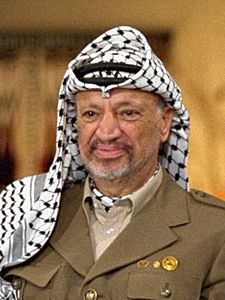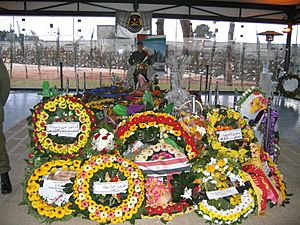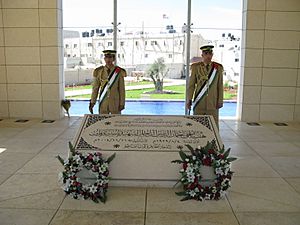Yasser Arafat facts for kids
Quick facts for kids
Yasser Arafat
|
|
|---|---|
|
ياسر عرفات
|
|

Arafat at the Nobel Peace Prize presentation in Oslo, Norway, December 1994.
|
|
| 1st President of the Palestinian National Authority | |
| In office 5 July 1994 – 11 November 2004 |
|
| Prime Minister | |
| Succeeded by | Rawhi Fattouh (interim) |
| 3rd Chairman of the Palestine Liberation Organization | |
| In office 4 February 1969 – 29 October 2004 |
|
| Preceded by | Yahya Hammuda |
| Succeeded by | Mahmoud Abbas |
| Personal details | |
| Born |
Mohammed Abdel Rahman Abdel Raouf Arafat al-Qudwa al-Husseini
4/24 August 1929 Cairo, Egypt |
| Died | 11 November 2004 (aged 75) Clamart, Hauts-de-Seine, France |
| Resting place | Arafat's compound |
| Nationality | Palestinian |
| Political party | Fatah |
| Spouse |
Suha Arafat
(m. 1990) |
| Children | 1 |
| Alma mater | University of King Fuad I |
| Profession | Civil engineer |
| Signature |  |
| Nickname | Abu Ammar |
Yasser Arafat (born Mohammed Abdel Rahman Abdel Raouf Arafat al-Qudwa al-Husseini; August 24, 1929 – November 11, 2004) was an important Palestinian political leader. He was the leader of the Palestine Liberation Organization (PLO) from 1969 to 2004. He also served as the first President of the Palestinian National Authority (PNA) from 1994 to 2004.
Arafat was a founder of the Fatah political party. He led Fatah from 1959 until his death in 2004. He believed in Arab nationalism, which means he supported the idea of Arab people working together.
Many Palestinians saw Arafat as a hero. He represented their hopes for a Palestinian state. However, some people in Israel viewed him as a terrorist.
Contents
Early Life and Education
Yasser Arafat was born in Cairo, Egypt. His father was Palestinian, and his paternal grandmother was Egyptian. Arafat was one of seven children. His mother passed away when he was only four years old.
When his father found it hard to raise all the children, Yasser and his brother Fathi went to live with their mother's family in Jerusalem. They stayed there for four years. Later, their older sister took care of them.
Arafat's Name
Arafat's full birth name was Mohammed Abdel Rahman Abdel Raouf Arafat al-Qudwa al-Husseini. In the early 1950s, he started using the name Yasser. This name is connected to Ammar ibn Yasir, a companion of the Islamic prophet Muhammad. He kept "Arafat" in his name because of its importance in Islam, referring to Mount Arafat.
University Years
In 1944, Arafat began studying at the University of King Fuad I and finished his degree in 1950. During his time at university, he became interested in Arab nationalist ideas. He was against the creation of the State of Israel in 1948. He even fought alongside the Muslim Brotherhood during the 1948 Arab–Israeli War. After the war, he returned to Cairo. From 1952 to 1956, he was the president of the General Union of Palestinian Students.
Rise of Fatah
In the late 1950s, Arafat helped start Fatah. This group aimed to create a Palestinian state. Fatah operated from different Arab countries. From there, they carried out actions against Israeli targets.
Arafat's influence grew in the late 1960s. In 1967, he joined the Palestine Liberation Organization (PLO). In 1969, he was chosen as the chairman of the Palestinian National Council (PNC).
Fatah's presence in Jordan led to conflicts with the Jordanian government. Because of this, Fatah moved its operations to Lebanon in the early 1970s. In Lebanon, Fatah supported the Lebanese National Movement during the Lebanese Civil War. They also continued their actions against Israel. This led to Israel invading Lebanon in 1978 and 1982.
Leader of the Palestinians
From 1983 to 1993, Arafat lived in Tunisia. During this time, he started to change his approach. He moved from fighting to trying to find solutions through talks. In 1988, he accepted Israel's right to exist. He then worked towards a two-state solution for the Israeli–Palestinian conflict. This means having both an Israeli state and a Palestinian state living side-by-side.
In 1994, Arafat returned to Palestine. He settled in Gaza City and worked to promote self-governance for the Palestinian areas. He took part in many talks with the Israeli government to end the conflict. These talks included the Madrid Conference of 1991, the 1993 Oslo Accords, and the 2000 Camp David Summit.
The success of the Oslo Accords led to Arafat receiving the Nobel Peace Prize in 1994. He shared this award with Israeli Prime Ministers Yitzhak Rabin and Shimon Peres.
Personal Life
In 1990, Yasser Arafat married Suha Tawil. He was 61 years old, and Suha was 27. Her mother introduced them in France. Suha later worked as Arafat's secretary in Tunis. Before his marriage, Arafat adopted fifty Palestinian children who had lost their parents in wars. In 1995, Arafat and Suha had a daughter named Zahwa. She was named after Arafat's mother.
Death
Yasser Arafat passed away on November 11, 2004, at the age of 75. He died due to a hemorrhagic stroke.
Funeral and Burial

Arafat was first buried temporarily in the Mukataa in Ramallah. Tens of thousands of Palestinians attended the ceremony. He was buried in a stone coffin. A Palestinian spokesman said that Arafat would be reburied in East Jerusalem once a Palestinian state was created.
Later, it was found that Arafat was not buried according to Islamic law. So, he was reburied on November 13 at around 3:00 AM. On November 10, 2007, a mausoleum was opened for Arafat near his tomb. This was done to honor him.
Legacy
Several places have been named in honor of Yasser Arafat:
- Martyr Yasser Arafat Governmental Hospital
- Yasser Arafat Cup
- Yasser Arafat International Airport
See also
 In Spanish: Yasir Arafat para niños
In Spanish: Yasir Arafat para niños
 | Calvin Brent |
 | Walter T. Bailey |
 | Martha Cassell Thompson |
 | Alberta Jeannette Cassell |


